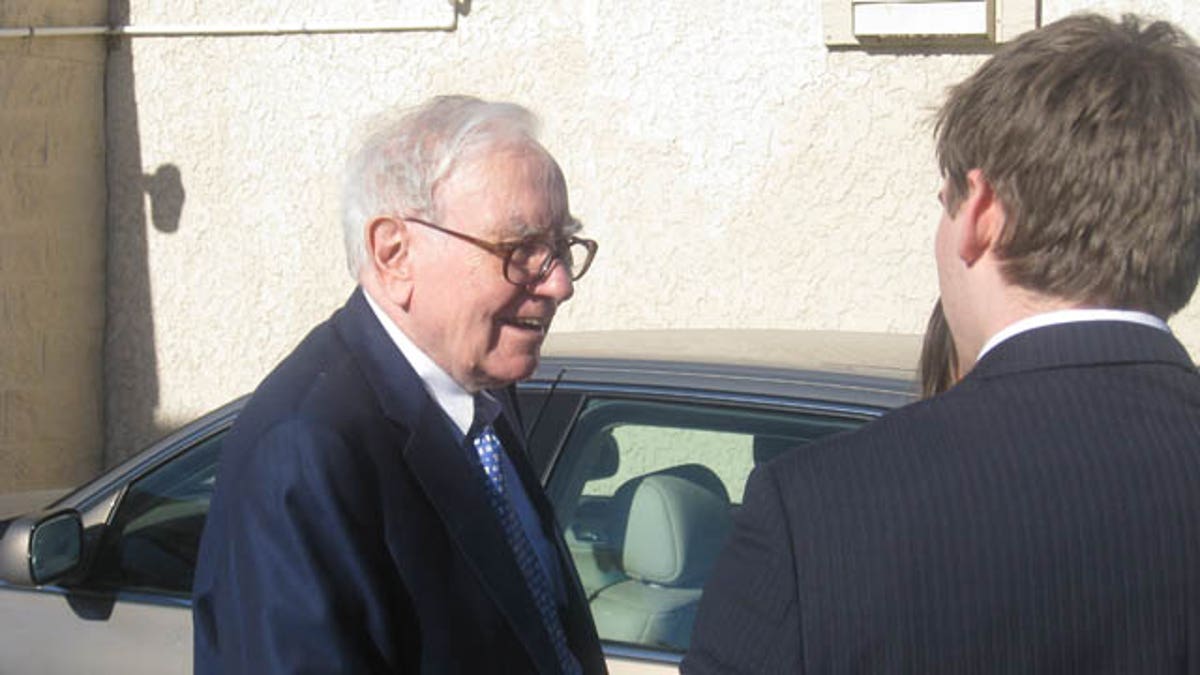
This photo shows Warren Buffett. (Fox News)
As the White House champions the "Buffett rule" -- the principle underlying President Obama's call for raising taxes on the wealthy, the investment mogul is challenging lawmakers to bring down government spending -- and credited Mitt Romney for a proposal to reduce federal spending.
"Just the other day, Governor Romney talked about bringing the 25 percent down to 20 percent; I agree with him. I mean, I applaud him," Buffett told a crowd of 120 college students attending a meet-and-greet at Buffett's Omaha, Neb., offices of Berkshire Hathaway last week.
Buffett, who is listed as No. 3 on Forbes magazine's Billionaires List, said he is up for anyone that comes up with a good solution to balance a federal ledger that has been off-kilter for years.
"The stimulus bill is really the excess of government expenditures over government income and we have had our foot to the floor on that as well. We didn't just pass the stimulus bill a couple of years ago, we have been running deficits of GDP at the federal level of 8 to 10 percent, and, by any definition, that's huge stimulus," he said.
But that doesn't means he doesn't still support raising taxes on millionaires and billionaires.
"If you are way out of balance and the ultra-rich are paying less than they ever have, that certainly might be a place to look," Buffett said. "My own tax rate, I’ve never paid a lower tax rate than in the last decade. I mean, back when I was making $15-$20,000 a year, I was paying more taxes as a percentage of my income by far than I am now."
The American business magnate invited six universities across the nation to bring 20 college students each to meet, interact and dine with him. The participants toured two of his subsidiaries, participated in a Q&A at the Berkshire Hathaway office and ate at his beloved Piccolo Pete's restaurant.
In the candid two-hour Q&A, Buffett said the government is pushing in the opposite direction of the "remarkable" system created by the Founding Fathers that aimed to unlock human potential.
Buffett said a disproportional tax policy as well as fiscal and monetary policy has stifled the "equality of opportunity."
"This government has really taken care of guys like me," he said. "My tax rate, counting payroll taxes and income taxes, what gets sent to the federal government has been way lower than anybody else in the office. You know, the 15 to 20 people with me."
While Buffett has been the poster boy for Democrats decrying the tax code as leaning toward the wealthy, the businessman pointed his finger at both Democratic and Republican lawmakers for failing to balance the budget.
"In Washington, they are trying to make sure somebody else pays the taxes instead of them; I mean, that's the way democracy works. And a big democracy and a rich democracy produces lots of money and politics tries to impose itself while somebody else pays,” Buffett said.
He added that the "natural juices" of capitalism, not government intervention, will pull the U.S. out of recession.
Several critics of Buffett point out that many lower income Americans don't pay income taxes at all -- 43 percent, according to 2009 figures -- and the payroll tax is their only burden. Buffett said he compared his tax numbers to all the people in his office, and as a percentage, he still ends up ahead.
"The payroll tax my cleaning lady was paying two years ago, just the payroll tax, was higher than my entire tax would be on capital gains for government," Buffett said. "Can you just imagine that? People forget about the payroll tax."
That's the argument the White House has used to push for a payroll tax cut extension, as well as other changes in the tax code that would raise the burden on the wealthy.
On Wednesday, White House spokesman Jay Carney said President Obama is "for both corporate tax reform and individual tax reform," which for the latter means applying the "Buffett rule."
"It simply as a matter of fairness does not make a lot of sense for millionaires and billionaires to be able to pay taxes at a much lower rate than somebody making $100,000 a year or less. And so that is a principle he would bring to bear here," Carney said of the president.
"I had this boyhood dream I would have a tax named after me," Buffett joked with the group.
Buffett, 81, told the students that they have to come up with their own philosophy about what they owe society and what society owes them. That can come from reading, following the lessons of people they admire and speaking with one's own family members, as he did when he was young.
"We talked politics all the time when I was 7 or 8 years old. They wouldn't serve me dinner if I didn't swear an oath to cuss out Roosevelt at school the next day," he said.




